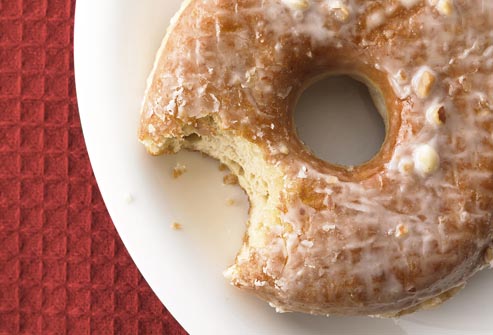
By Joan Kent
One significant reason for sugar cravings is withdrawal. Withdrawal can promote cravings under various circumstances.
If someone has recently stopped drinking alcohol, cravings for sugar can be strong and frequent. This involves the brain chemicals stimulated by alcohol. The same three chemicals (dopamine, beta-endorphin, and serotonin) are also stimulated by sugar.
The similarity makes sugar a short-term substitute for alcohol when cravings occur. It also explains why people in recovery from alcohol (or drugs) may crave sugar and may eat it often or in large quantities. Or both.
The phenomenon is so common that AA meetings typically feature back-of-room treats that are laden with sugar: cookies, brownies, cakes, pastries. That approach can backfire, but we”™ll get to that in a moment.
If someone is addicted to sugar, quitting sugar can lead to cravings. The effect may sometimes be similar to the symptoms of alcohol withdrawal or opiate withdrawal — and also similar to the symptoms of hypoglycemia (low blood glucose).
(As a side note, I postulated years ago that hypoglycemia — especially reactive hypoglycemia, the rapid glucose drop following sugar ingestion in susceptible people — was a specific case of sugar withdrawal. Reviewing the lists below makes it seem there”™s a case to be made for that.)
Research shows that cravings are highest when withdrawal is most severe. The higher the level of intake prior to abstinence, the greater the withdrawal and subsequent craving.
Anyway, let”™s look at the symptoms in the different cases.
Alcohol withdrawal symptoms include anxiety, nervousness, depression, fatigue, irritability, shakiness, mood swings, nightmares, pupil dilation, clammy skin, headaches, insomnia, nausea, vomiting, sweating, muscle tremor, confusion, rapid heart beat.
Symptoms of hypoglycemia include shakiness, nervousness, anxiety, sweating, chills, irritability, confusion, rapid heartbeat, lightheadedness, dizziness, hunger, nausea, sleepiness, blurred vision, tingling or numbness in the lips or tongue, headaches, weakness, fatigue, anger, sadness, lack of coordination, nightmares, seizures, unconsciousness, confusion, difficulty speaking, night sweats, waking up tired, irritable or confused.
Opiate withdrawal symptoms include agitation, anxiety, muscle aches, eye tearing, insomnia, runny nose, sweating, yawning, abdominal cramping, diarrhea, dilated pupils, goose bumps, nausea, vomiting, fever.
Research on lab animals that have been made addicted to sugar lists withdrawal symptoms that resemble those of opiate withdrawal.
An internet search on symptoms of sugar withdrawal offers lists that include hunger and the desire for sugary foods; headaches; low energy, fatigue; mood swings, crankiness; muscle aches and pains; nausea and other gastric upsets; chills or sweating, especially at night; runny nose; yawning; insomnia.
As you can see, there is quite a bit of overlap in these various symptom lists.
So is sugar withdrawal just like withdrawal from opiates or alcohol? Some would say yes. Some would say that”™s too big a stretch. After all, the body has only so many ways of expressing itself, so a similarity in symptoms doesn”™t necessarily link them.
But we do know that sugar affects, either directly or indirectly, the same brain chemicals that are affected by alcohol and opiate drugs. As mentioned above, the similarity makes sugar a short-term substitute for alcohol.
However! Eating sugar when you crave either alcohol or sugar can backfire, due to a phenomenon known as priming (i.e., a little makes us want more).
Some people insist priming doesn”™t apply to food, just to alcohol or drugs. Clinical experience shows that it does apply, and that avoiding possible priming cues goes a long way toward ending cravings. My advice would be to take priming seriously if you want to end sugar cravings.
[If you have students who need help dealing with sugar cravings and sugar addiction, please let me help. My new program, Last Resort Nutrition® with Joan Kent, starts soon. I also offer individual coaching.]
- Motivation vs. Enthusiasm - December 29, 2025
- Focus - August 16, 2025
- Raw Food Diets: How Good Are They For Us? - March 17, 2025

Joan you are so right – I had a bunch of friends who went through treatment years ago. Most of them ended up getting clean – except for their new addiction to Mountain Dew 🙁
Thanks for your comment, John, and it’s absolutely accurate. The AA view seems to be that sugar is the lesser of the two evils, but the fact that it can lead to an alcohol relapse has to cast doubt on that perspective. Of course, AA does what it does its own way, and the neurochemical stuff isn’t part of it. They’re doing great work for their participants.
Thanks,
Joan